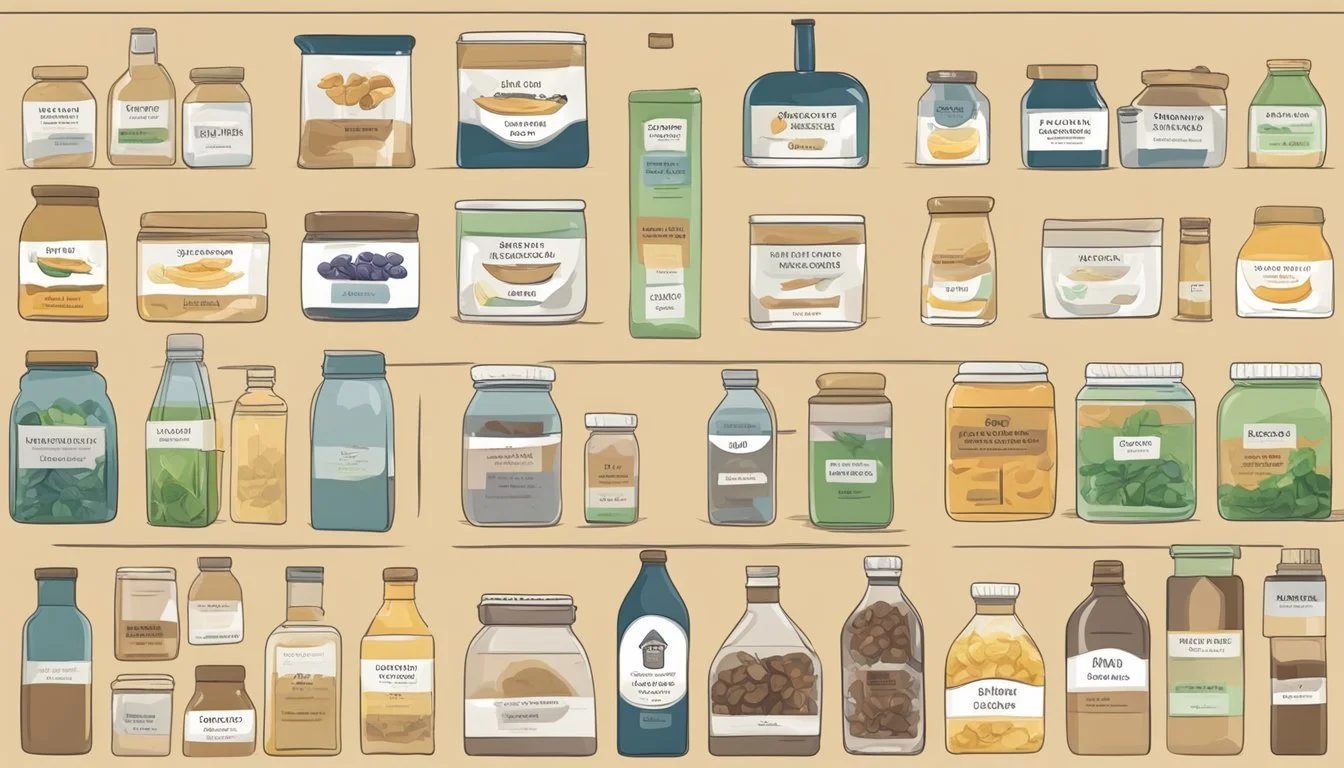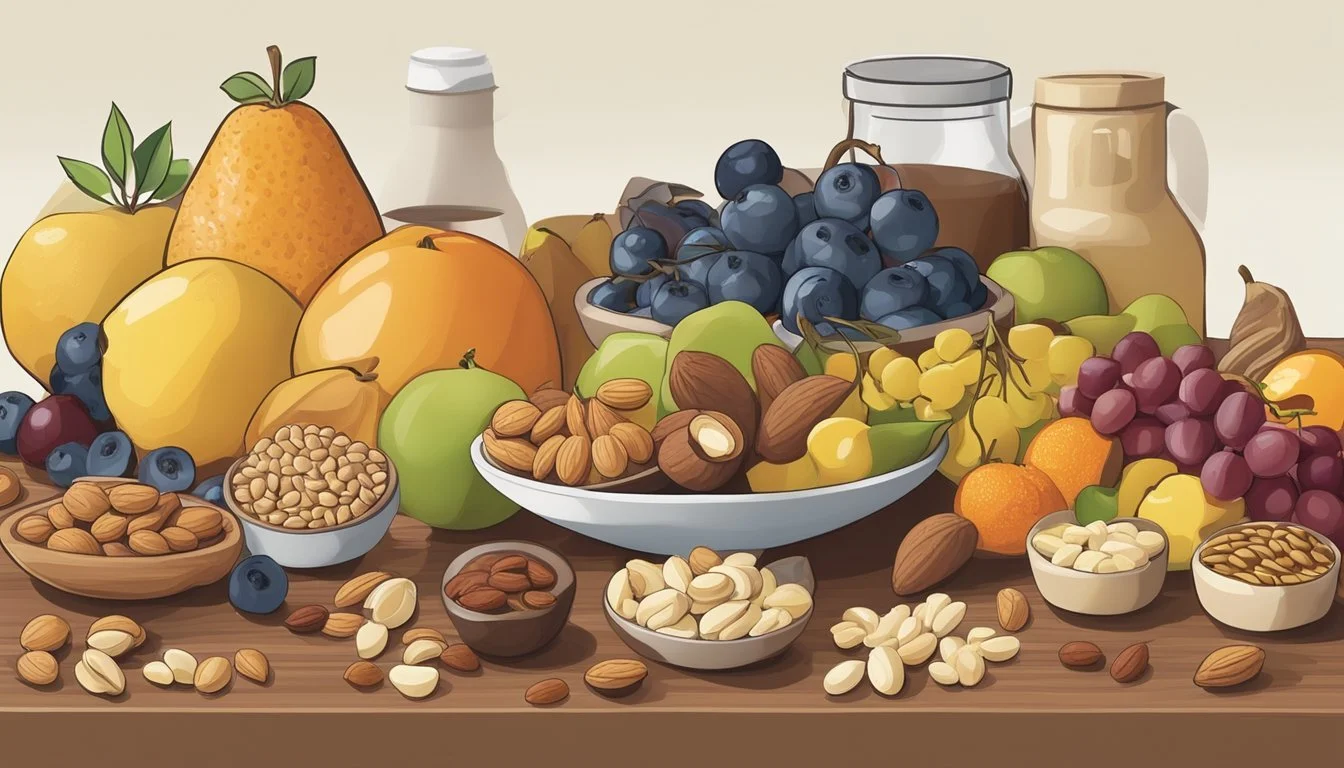Dates Substitutes
Healthy Alternatives for Sweetening Recipes
For those who enjoy the sweet and chewy texture of dates but are looking for alternatives, there are plenty of substitutes that offer similar flavors and benefits. Whether it’s for baking, cooking, or simply snacking, replacing dates with other ingredients can be a seamless process. Dried figs, prunes, and dried apricots are among the top substitutes for dates due to their natural sweetness and comparable textures.
Dried fruits like cranberries, jujubes, and raisins are also excellent alternatives. These substitutes not only mimic the sweetness of dates but also provide a range of nutritional benefits. For instance, prunes are rich in dietary fiber and essential vitamins, making them a nutritious option.
In various recipes, mashed bananas and apple sauce can be used as binders, often serving as vegan alternatives. These substitutes can be versatile, fitting perfectly into smoothies, shakes, and baked goods without compromising the flavor. With so many options available, finding a suitable substitute for dates is a simple task that can enhance your culinary creations.
Understanding Dates and Their Culinary Role
Dates are sweet fruits that come from the date palm tree and are prized for their rich, caramel-like flavor. Integrating them into different dishes makes them incredibly versatile in cooking and baking.
Nutritional Profile of Dates
Dates are highly nutritious and often consumed for their energy-boosting properties. They are naturally high in sugars like glucose, fructose, and sucrose which provide a quick source of energy.
They are also rich in dietary fiber, aiding in digestion and promoting gut health. Important vitamins and minerals found in dates include vitamin B6, potassium, magnesium, and iron. These nutrients contribute to overall health, including maintaining blood pressure, strong bones, and stable energy levels. Additionally, dates contain antioxidants which help reduce inflammation and protect against oxidative stress.
Culinary Uses of Dates
Dates are incredibly versatile in the kitchen and can be used in both sweet and savory dishes. Their natural sweetness makes them an excellent substitute for refined sugars in recipes. They are commonly used in baking to add moisture and a sweet, caramel-like flavor to cakes, cookies, and muffins.
In savory dishes, dates can be chopped and added to salads, grain dishes, or even meat stews to add a hint of sweetness. They are also popular in the form of date paste or syrup, used in energy bars and homemade snacks as a natural sweetener and binder. Due to their chewy texture, dates are also a great addition to granolas and trail mixes.
Common Date Substitutes
Several substitutes can replace dates in recipes, each offering unique flavors and textures. These options include various dried fruits, syrups, and natural sweeteners that cater to specific culinary needs.
Dried Fruit Alternatives
Prunes: Prunes, or dried plums, are a popular substitute for dates. They have a sweet, chewy texture and deep flavor, making them suitable for baked goods like cakes and muffins.
Dried Apricots: These fruits are slightly tart but can mimic the sweetness and chewy texture of dates when used in recipes. They work well in salads, desserts, and breakfast dishes.
Raisins: When soaked in water, raisins become plump and more tender, providing a milder flavor than dates but still adding natural sweetness and texture to dishes.
Dried Figs: Figs offer a chewy texture and a rich, slightly nutty flavor. They are a good replacement in both sweet and savory recipes, blending well into cakes and salads.
Dried Cranberries: These are excellent for adding a tangy twist to recipes needing a date substitute. They work well in baked goods and salads due to their tart taste.
Syrups and Liquid Sweeteners
Date Syrup: Made from dates, this syrup provides a similar flavor and sweetness intensity as whole dates. Ideal for smoothies, baking, and drizzling over desserts or pancakes.
Maple Syrup: While not as thick as date syrup, it offers a caramel-like sweetness. This makes it a versatile sweetener for both cooking and baking.
Honey: Honey is a widely used natural sweetener that imparts a floral sweetness. It is excellent in baking and cooking, providing moisture and flavor.
Molasses: This thick, dark syrup offers a robust, somewhat bitter sweetness. It mimics the rich flavor of dates and is suitable for gingerbread and other robust-flavored baked goods.
Natural Sugar Alternatives
Jaggery: A traditional unrefined sugar common in South Asian cuisine. It provides a deep, molasses-like flavor suitable for recipes requiring dates' complexity.
Mashed Banana: While not sugary like dates, mashed bananas act as a natural sweetener and binder in baking. They are perfect for cakes, muffins, and smoothies.
Applesauce: It adds moisture and mild sweetness to recipes. This makes it a good binder and sweetener in baked items, similar to how dates would function.
Specific Substitutes and Their Properties
Various substitutes for dates can match their sweetness, texture, and nutritional benefits. Each alternative offers unique properties that may enhance different culinary applications.
Raisin Varieties as Substitutes
Raisins are a versatile substitute for dates, available in multiple varieties like Thompson Seedless and Golden raisins. They provide a similar natural sweetness and can be used as a direct replacement in recipes.
Raisins are rich in potassium, calcium, and antioxidants, making them a nutritious option. Soaking raisins in water overnight softens them, mimicking the chewiness of dates. Their small size makes them ideal for baking, adding to oatmeal, or incorporating into salads.
Using Prunes for Their Chewy Texture
Prunes, dried plums known for their sweet and chewy texture, are another excellent substitute for dates. They contain significant amounts of dietary fiber, potassium, and magnesium.
Prunes work well in baked goods such as cakes and muffins, providing moisture and a deep, rich flavor. They can also be puréed to create a natural sweetener for sauces and dressings. Their chewy consistency makes prunes an authentic alternative to dates in many recipes.
The Versatility of Dried Apricots
Dried apricots offer a slightly tart yet sweet flavor that can stand in for dates. They are incredibly versatile, fitting into a variety of dishes from baked goods to savory salads.
Nutritionally, dried apricots are high in calcium, potassium, and antioxidants, making them a healthy choice. Soaking them can enhance their tenderness, making them easier to incorporate into recipes that require a softer texture.
Incorporating Figs for Nutritional Value
Dried figs are packed with dietary fiber and essential minerals like calcium and potassium. These fruits are often used as date substitutes due to their sweet taste and chewy texture.
Figs can be chopped and added to baked items, salads, and oatmeal. Their naturally high sugar content makes them an effective sweetener, while their nutritional profile supports bone health and digestion. This blend of flavor and health benefits makes figs a practical substitute.
Selecting the Best Substitute for Recipes
When choosing substitutes for dates, it's crucial to consider the specific needs of your recipe. The texture, sweetness, and usage context vary, so selecting the right alternative can impact the final dish significantly.
Baked Goods and Desserts
For baking and desserts, the moisture content and sweetness of the substitute are essential to maintain the desired texture and flavor. Prunes are a popular choice due to their similar chewy texture and rich flavor. They work well in cakes, cookies, and muffins. Dried figs and dried apricots are also excellent options, providing natural sweetness and a slightly different but complementary taste. Using mashed bananas or apple sauce as binders can help achieve the right consistency, especially in vegan and low-fat recipes.
Raw Recipes and Smoothies
When making raw recipes and smoothies, natural sweetness and ease of blending are key. Ready-made date syrup is a convenient choice, offering a similar sweetness and smooth texture. Dried jujubes, dried figs, and other dried fruits blend easily into smoothies, providing fiber and nutrients. For a different flavor profile, monkfruit combined with erythritol can be used to create a sugar-free mix, ideal for those monitoring their sugar intake. Raisins, when hydrated overnight, also blend well and add a softer, nuanced sweetness.
Savory Dishes
In savory dishes, the goal is often to balance flavors without overpowering them with sweetness. Dried cranberries are a versatile choice, offering a slight tartness that complements savory ingredients in salads, sauces, and grain dishes. Prunes can also be used to add depth to stews and sauces, while maintaining a subtle sweetness. Dried jujubes are another excellent substitute, particularly in Middle Eastern and Asian recipes, where their unique flavor enhances the dish without being too sweet. Using these alternatives ensures the final dish remains balanced and appetizing.
Health and Nutritional Considerations
When considering substitutes for dates, it is essential to evaluate not only their sweetness but also their nutritional benefits. Different substitutes offer varying levels of sugars, minerals, and antioxidants.
Comparing Sweetness and Sugar Content
Dates are appreciated for their natural sweetness, driven by their high sugar content. Alternatives like prunes, dried raisins, and dried apricots also contain significant amounts of natural sugars. These substitutes can match the sweetness of dates, making them suitable for recipes requiring sugar.
Maple syrup and cane sugar can also replace dates, with maple syrup providing a unique flavor. However, it's crucial to note that while these alternatives replicate sweetness, they may differ in how they affect blood sugar levels.
Substitute Sweetness Sugar Content (per 100g) Prunes High ~38g Dried Raisins High ~60g Dried Apricots Medium ~53g Maple Syrup High ~60g Cane Sugar Very High ~100g
Evaluating Mineral and Antioxidant Levels
Dates are known for their rich mineral content, including potassium, magnesium, calcium, and iron. Substitutes like dried apricots and figs also offer good amounts of these minerals.
For instance, dried apricots are excellent sources of potassium and iron. Figs provide a decent amount of calcium and magnesium. These minerals are essential for various bodily functions, including maintaining heart health and bone strength.
Antioxidants are another critical factor. Dates contain high levels of antioxidants, which help combat oxidative stress. Similarly, raisins and prunes are rich in antioxidants, providing similar health benefits.
Substitute Potassium (mg/100g) Magnesium (mg/100g) Calcium (mg/100g) Iron (mg/100g) Antioxidants Dried Apricots 1162 32 55 2.7 High Figs 680 68 162 2.0 High Dried Raisins 749 32 50 1.9 Very High Prunes 732 41 43 0.9 Very High
Practical Tips for Using Date Substitutes
When using date substitutes like raisin paste or dried apricots, it's essential to store them properly and adjust recipes to achieve the desired taste and texture. Attention to storage techniques and recipe ratios ensures that substitutes maintain their shelf life and soft texture.
Proper Storage Techniques
Storing date substitutes properly is crucial for maintaining their quality and extending their shelf life. Dried fruits like prunes, apricots, and cranberries should be kept in an airtight container in a cool, dry place. For longer storage, they can be refrigerated or frozen.
Raisin paste and date paste should be stored in airtight containers in the refrigerator. This prevents them from drying out and helps maintain their soft texture. If you have large quantities, portion them out and freeze for later use.
Adjusting Recipes and Ratios
When substituting dates in a recipe, adjusting the ratios ensures the right balance of sweetness and texture. Dried apricots and prunes are often excellent substitutes due to their similar sweetness and chewiness. Use a 1:1 ratio, meaning if a recipe calls for one cup of dates, you can use one cup of prunes or apricots.
If a recipe relies on the binding properties of dates, mixing in mashed banana or apple sauce can help. For sweet dishes, ensure substitutes are soft and hydrated. Soaking dried fruits in warm water for about 10-15 minutes can improve their texture and make them easier to blend into recipes.
Other Considerations in Choosing Date Substitutes
Choosing the right date substitute involves evaluating several factors such as texture, dietary restrictions, and cost. Each substitute has unique properties that may or may not suit your culinary needs.
Culinary Textures and Consistencies
Different dried fruits offer varying textures. For instance, prunes provide a chewy consistency similar to dates, making them ideal for cakes and cookies.
Dried apricots also work well but have a slightly firmer texture.
If a softer texture is needed, consider using mashed bananas or apple sauce, which not only act as binders but also impart moisture to baked goods.
Raisins and dried cranberries are efficient for salads and oatmeal but can alter the recipe's texture due to their smaller size and different drying process.
Allergies and Dietary Restrictions
When choosing substitutes, it’s crucial to consider potential allergies and dietary needs. Nuts, often used in combination with dried fruits, can pose allergy risks.
Dried coconut and natural sweeteners such as honey or maple syrup are suitable for those allergic to tree nuts.
For low sugar diets, dried fruits offer a high natural sugar content, unlike certain cane sugar substitutes which are processed and can be avoided.
Fruit-based options like apple sauce or mashed bananas are lower in calories but still provide the necessary sweetness.
Availability and Cost
The availability of substitutes can vary by region and season. Dried figs, jujubes, and other similar dried fruits might not be readily available in all areas.
Apple sauce and mashed banana are often more accessible and economical options.
The cost can also be a determining factor. Imported dried fruits like medjool dates can be pricey compared to local options such as raisins or dried apricots.
Evaluate the cost implications for large batch preparation, especially if substitutes are needed frequently.





